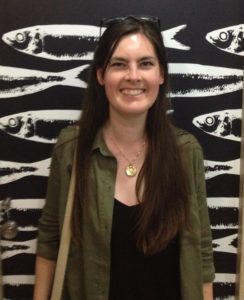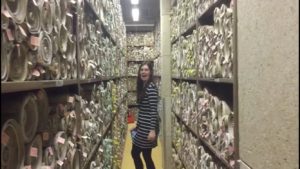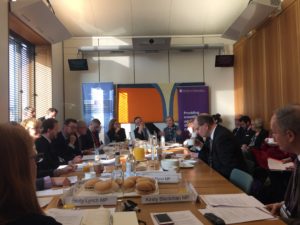 Hi! I’m Katherine Maltby, a PhD student in the Biosciences department here at the University of Exeter. I’m in my final year, working on a project looking at the impact of climate change on fisheries in the south west of the UK. So far, my project has involved producing future projections of climate change impacts on fish stocks, as well as interviewing fishermen to explore their perceptions of climate change and its potential impacts. As part of my PhD I decided to take a break and undertake a placement at the Houses of Parliament to find out more about how scientific evidence is used in policy and decision making. You can find out more about my research adventures on my personal blog: https://fishingforecast.wordpress.com/
Hi! I’m Katherine Maltby, a PhD student in the Biosciences department here at the University of Exeter. I’m in my final year, working on a project looking at the impact of climate change on fisheries in the south west of the UK. So far, my project has involved producing future projections of climate change impacts on fish stocks, as well as interviewing fishermen to explore their perceptions of climate change and its potential impacts. As part of my PhD I decided to take a break and undertake a placement at the Houses of Parliament to find out more about how scientific evidence is used in policy and decision making. You can find out more about my research adventures on my personal blog: https://fishingforecast.wordpress.com/
For the past three months I’ve been fortunate enough to undertake a fellowship at the Parliamentary Office of Science and Technology (POST), which was sponsored by the British Ecological Society. It’s been a whirlwind of interviewing, writing and all things fish! My fellowship finally culminated with a new POSTnote on UK Fisheries Management that was launched at a packed breakfast briefing attended by many MPs and Peers in Portcullis House on 21st February.
In case you’re wondering what POST or a POSTnote is, let me fill you in. POST is essentially Parliament’s in-house source of science advice, providing independent, impartial and balanced analyses of public policy issues related to science and technology. By doing this, it provides MPs and Peers with information in an accessible and timely way that can help to increase understanding and awareness on often-complex topics. POSTnotes are one of the main mechanisms through which POST provides this information, and these are four-page briefings that summarise current knowledge on a topic. To go about producing one is a well-formulated step-by-step process, normally starting with a desk-based literature review to help develop the scope of the POSTnote and get you up to speed on what topics you’ll cover. For my POSTnote, I had to cover how science advice is generated and used in fisheries management, the UK and EU fisheries management practices currently in place, and the opportunities and challenges for UK fisheries management in the future. With Brexit, a new fisheries policy is currently being developed and so my POSTnote has hopefully been well timed to help inform discussions and debate on these topics.
The next step of producing a POSTnote involves interviewing relevant stakeholders from academia, industry, government and the third sector to get their perspectives and essentially help flesh out the POSTnote. I really enjoyed this part and getting out and speaking to people, although this didn’t help with reducing the number of topics that I wanted to consider writing about! Finally, and most importantly, after all of this information gathering the writing process begins. As a fisheries scientist myself this was something I struggled with at the start of writing as for me everything seemed important and I felt it needed to be included. As the writing process went on, I realised that this a) simply wasn’t possible and b) wasn’t entirely necessary – in order for people to understand a topic it doesn’t mean they necessarily need to know everything single thing about it. It was my job to tell them the key points, issues and concepts in the simplest and most logical way possible. The POSTnote has to go through numerous reviews before being published including an internal review, external review and final sign-off, in addition to all the drafts in between! It was a tough job but I think I learnt a lot of new skills about how to communicate scientific topics to a policy audience. I then finally launched the POSTnote at a breakfast briefing which I organised to provide an opportunity for MPs and Peers to discuss fisheries and the issues surrounding science and management.
Aside from producing the POSTnote itself, the fellowship was also a great way to learn more about how Parliament works and how evidence is used in decision making. I had a hall pass for the whole Westminster estate which meant I could attend events, debates and anything else that was going on (including getting a pint or two at the infamous Sports and Social Bar!). Some highlights included going to Prime Minister’s Questions, an evidence session for the EFRA select committee’s inquiry on ‘Fisheries’, being involved in a ‘fake parliament’ exercise that was held in a temporary chamber and also attending the annual fisheries debate in the main chamber.
Overall, working at POST was a brilliant experience and I can’t thank the British Ecological Society and POST enough for giving me the opportunity to work there. I would really recommend doing the placement to other PhD students – you can get funding through numerous research councils as well as learned societies. It gave me a whole new perspective on how scientific evidence is used within decision making and the need to communicate this evidence clearly, accurately and effectively. Here’s hoping that this new POSTnote will be useful in informing further debates and discussions on future UK fisheries policy!
Written by: Katherine Maltby (final year PhD researcher in Biosciences)


